Matching Your Balloon To Your Reaction Is Important. #aesthetic


Matching your balloon to your reaction is important. #aesthetic
More Posts from Secretagentpeptidebond and Others
Video Clip SS241672 (Dendritic Ice Crystal Growth)
Macro timelapse footage of Dendritic Ice Crystals Growing.
At sub zero temperatures, moisture from the surrounding atmosphere condenses almost immediately. The dendritic (tree-like) form of the crystallization is a natural fractal pattern.
As a rule, except in conditions where supercooled droplets are present in the air, frost will form only if the deposition surface is colder than the surrounding air. For instance frost may be observed around cracks in cold wooden sidewalks when humid air escapes from the warmer ground beneath. Other objects on which frost commonly forms are those with low specific heat or high thermal emissivity, such as blackened metals; hence the accumulation of frost on the heads of rusty nails.
© Francis Chee / Science Source






Babel Tower: A Kinetic Mirrored Ziggurat Reflects the Surrounding Iranian Landscape / By Shirin Abedinirad and Gugo Torelli.
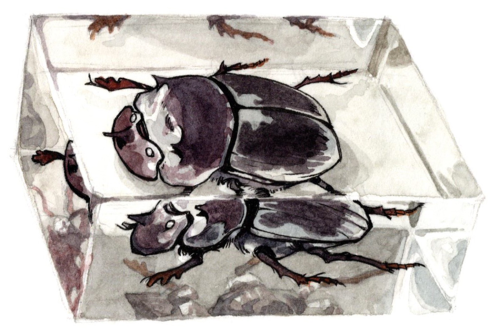
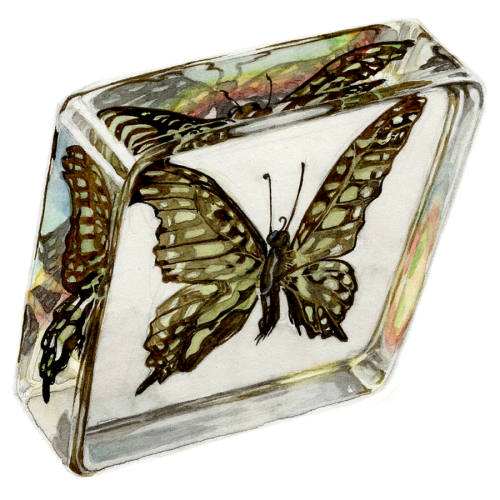
girl help im trapped in resin
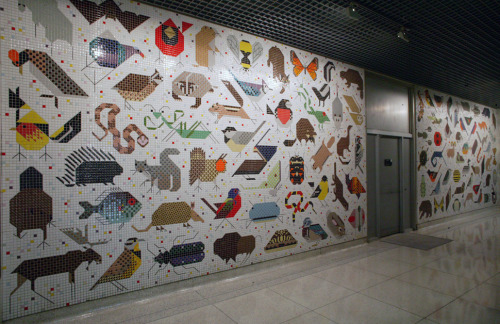
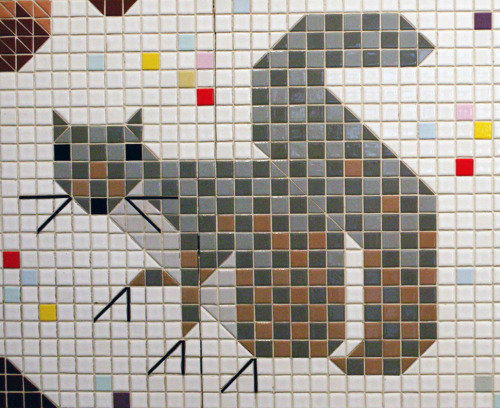
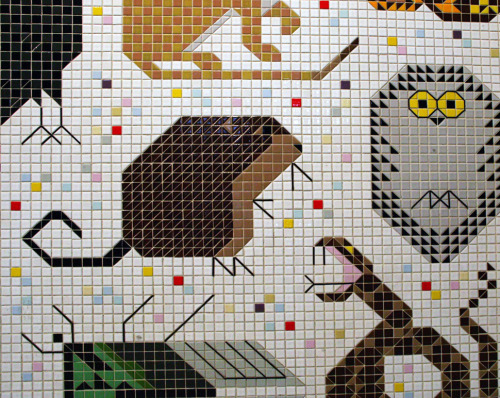
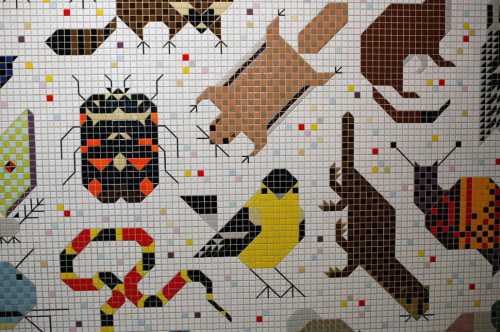
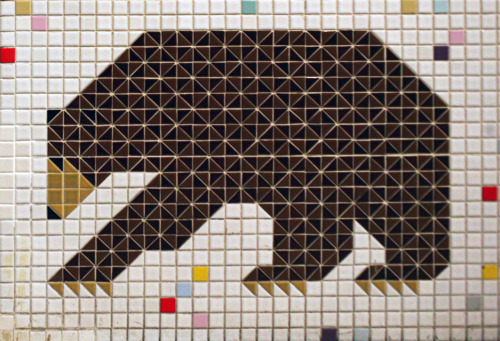
Space For All Species Mural
Charley Harper’s first ever mural ‘Space For All Species’ is located in the John Weld Peck Federal Building at 550 Main St. in downtown Cincinnati. Completed in 1964 the design is comprised of two 18×10½ ft panels that feature over 100 species of North American Animals. The tiles were made by Cambridge Tile Company in Cincinnati, OH. more…

Wind tunnel testing plays a major role in the planning of many space missions. Here a model of the Mars Sample Return Orbiter is tested at Mach 10 to determine the heat shield’s response to aerobraking off Mars’ atmosphere. The colors are the result of electron beam fluorescence, in which an electron gun is used to ionize molecules in the flow, which causes them to emit photons (light). The technique can be used for flow visualization–as in the case of the shock waves shown here–or to measure flow characteristics like density, temperature, and velocity. (Photo credit: Thierry Pot/DAFE/ONERA)
On the care and keeping of your scientist
Congratulations on adopting a scientist! Regardless of their field they will require much coffee, free food, and love. Here are some field specific tips for keeping your scientist happy and healthy!
Biology: make sure they don't get overly invested in their model organism by reminding them about the flaws inherent in their system on a regular basis, but also make sure to join in when they criticize other models in favor of their own
Chemistry: don't let them do that 'just one more reaction' at 10 pm. make sure they get out of the lab and see the sun on a regular basis. try to keep them from partying too hard when they do leave the lab
Geology: humor their rock puns but don't let the lick the rocks (they will tell you they need to lick the rocks to identify them, but don't fall for it)
Astronomy: try not to let them become completely nocturnal. point out nice stars to them and look suitably impressed by their "pictures" of planets that don't look like anything to you
Physics: take them to the park on a regular basis to remind them that things larger than subatomic particles exist. bring a frisbee or a ball to play catch with and be impressed by their ability to calculate trajectories
Math: always make sure to have free batteries for their calculators and a mathmatica user guide on hand. Humor them when they tell you why space without angles is important
Ecology: make sure they remember to wear sunscreen and keep an eye on them in the field. Remind them to come inside and analyze their data occasionally
Psychology: don't mention Freud or ever call them a soft or social science, but make sure you gently remind them that social factors can impact reproducibility and try to keep them from drawing sweeping conclusions about the inherent nature of humanity
Neuroscience: be suitably impressed by their newest experiment and then remind them that people are not mice as often as possible
Computer Science: make sure they take breaks while debugging by limiting their supply of coffee. Nod and smile when they go off on indexing and arrays. Make sure they always have a rubber duck.
Make sure to keep your scientist away from engineers unless they have been properly socialized to interact in a translational household. The most important thing is to remember to hug your scientist on a regular basis and remind them that there is life outside the lab
-
 18crown6ether liked this · 7 years ago
18crown6ether liked this · 7 years ago -
 anastomosis liked this · 7 years ago
anastomosis liked this · 7 years ago -
 merrickals reblogged this · 7 years ago
merrickals reblogged this · 7 years ago -
 merrickals liked this · 7 years ago
merrickals liked this · 7 years ago -
 seekerwitch166 liked this · 8 years ago
seekerwitch166 liked this · 8 years ago -
 bebravewalktall reblogged this · 8 years ago
bebravewalktall reblogged this · 8 years ago -
 guntzz-blog reblogged this · 8 years ago
guntzz-blog reblogged this · 8 years ago -
 girasoli-e-sorrisi liked this · 8 years ago
girasoli-e-sorrisi liked this · 8 years ago -
 llemonlleaf liked this · 8 years ago
llemonlleaf liked this · 8 years ago -
 almostgoneforgood liked this · 9 years ago
almostgoneforgood liked this · 9 years ago -
 nyc-chemist reblogged this · 9 years ago
nyc-chemist reblogged this · 9 years ago -
 nyc-chemist liked this · 9 years ago
nyc-chemist liked this · 9 years ago -
 seedotcom-blog liked this · 9 years ago
seedotcom-blog liked this · 9 years ago -
 vivaldisrain liked this · 9 years ago
vivaldisrain liked this · 9 years ago -
 arosetwopuppiesandasexypool-blog liked this · 9 years ago
arosetwopuppiesandasexypool-blog liked this · 9 years ago -
 soil-boy reblogged this · 9 years ago
soil-boy reblogged this · 9 years ago -
 ddaggett84 liked this · 9 years ago
ddaggett84 liked this · 9 years ago -
 iovocedelsilenzio liked this · 9 years ago
iovocedelsilenzio liked this · 9 years ago -
 smpietrasinski liked this · 9 years ago
smpietrasinski liked this · 9 years ago -
 auroramere liked this · 9 years ago
auroramere liked this · 9 years ago -
 ersatzmoniker888 liked this · 9 years ago
ersatzmoniker888 liked this · 9 years ago -
 scienceismyaesthetic reblogged this · 9 years ago
scienceismyaesthetic reblogged this · 9 years ago -
 beauty-and-the-memes reblogged this · 9 years ago
beauty-and-the-memes reblogged this · 9 years ago -
 beauty-and-the-memes liked this · 9 years ago
beauty-and-the-memes liked this · 9 years ago -
 cooldownskolar reblogged this · 9 years ago
cooldownskolar reblogged this · 9 years ago -
 crystallinehorror liked this · 9 years ago
crystallinehorror liked this · 9 years ago -
 onlyobeythedaleks reblogged this · 9 years ago
onlyobeythedaleks reblogged this · 9 years ago -
 secretagentpeptidebond reblogged this · 9 years ago
secretagentpeptidebond reblogged this · 9 years ago -
 lenovo-pc liked this · 9 years ago
lenovo-pc liked this · 9 years ago -
 tonnobarbuto liked this · 9 years ago
tonnobarbuto liked this · 9 years ago -
 joseluistajada-blog liked this · 9 years ago
joseluistajada-blog liked this · 9 years ago -
 itchbay-srps liked this · 9 years ago
itchbay-srps liked this · 9 years ago -
 deeplylearning liked this · 9 years ago
deeplylearning liked this · 9 years ago -
 aj-smk liked this · 9 years ago
aj-smk liked this · 9 years ago -
 ultrainfinitequest liked this · 9 years ago
ultrainfinitequest liked this · 9 years ago -
 bichemicalbromance reblogged this · 9 years ago
bichemicalbromance reblogged this · 9 years ago -
 whiskey0gin0vodka-aesthetics reblogged this · 9 years ago
whiskey0gin0vodka-aesthetics reblogged this · 9 years ago -
 colorandprecipitate liked this · 9 years ago
colorandprecipitate liked this · 9 years ago -
 oldoddandowly reblogged this · 9 years ago
oldoddandowly reblogged this · 9 years ago -
 frogbird6969 liked this · 9 years ago
frogbird6969 liked this · 9 years ago -
 deterministichaos-blog liked this · 9 years ago
deterministichaos-blog liked this · 9 years ago -
 weanward liked this · 9 years ago
weanward liked this · 9 years ago -
 queenchemistry reblogged this · 9 years ago
queenchemistry reblogged this · 9 years ago -
 wid-a-q reblogged this · 9 years ago
wid-a-q reblogged this · 9 years ago -
 willermo-ftw liked this · 9 years ago
willermo-ftw liked this · 9 years ago









